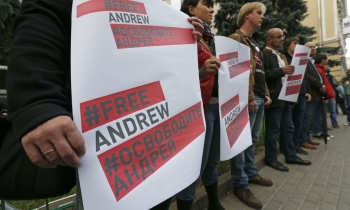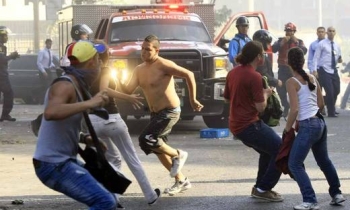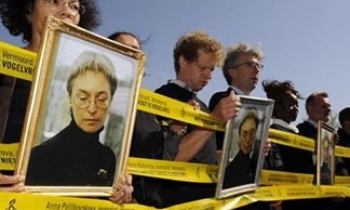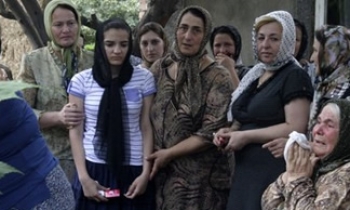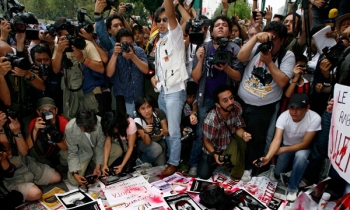KANO, Nigeria: Niger's government is struggling to control information about a nascent rebellion in its northern desert — suspending local media accused of backing the fighters and banning foreign reporters from the area. The rebels, though, have a Web site and satellite phones.
The Niger Movement for Justice started a campaign against the government early this year. They charge that the administration has reneged on promises of greater rights for members of the ethnic Tuareg minority — pledges that were key to a 1995 peace accord that ended a previous rebellion.
The rebels' complaints have increasingly been accompanied by violence. In June, the group attacked the airport in the northern city of Agadez and overran an army base in an assault that left 13 soldiers dead. The rebels also briefly held a Chinese uranium company executive and continue to hold dozens of hostages from the army base.
The government said three more soldiers were killed by a rebel-planted mine last week. A statement on the rebel Web site said that there was a confrontation, but that it was an exchange of gunfire in which five soldiers died.
Local media have reported that 4,000 government troops have been sent up to the north. Government communications officials said that they could not confirm the number of soldiers dispatched for security reasons.
It's hard to know how serious the situation is. An Associated Press reporter enquiring last week about traveling to the northern region of Agadez, where the rebels have bases, was told by government communications ministry officials that foreign reporters were banned from the area.
Broadcasts of Radio France International were banned last week for one month throughout the country because the Niger government says the FM station was promoting the rebels' cause.
Air Info, the major independent newspaper in the city of Agadez, was suspended in late June.
"There was a bad treatment of the information by this newspaper ... The newspapers have to treat this information with objectivity," said Ngoila Mounkaila, Niger's communications director.
The director of the paper, Ali Manzo Diallo, said he plans to fight the three-month suspension in the courts.
"There was no material proof that justified the closure of our newspaper," he said, adding that the government told him the paper's reports on the rebellion could lower troop moral.
Other Nigerien journalists have been reluctant to grant interviews, out of concern about government reprisals.
Still, the rebel group of just about 1,000 fighters has managed to get word out about its cause through the Internet and spokesmen stationed in Brussels and Paris. The group updates its blog regularly and quickly responds to e-mails sent to an address on the site.
Earlier this month, four weeklies in the capital, Niamey, received formal government warnings for reprinting rebel dispatches from the Web site, according to the New York-based Committee to Protect Journalists.
Meanwhile, rebel leader Aghali Alambo conducts interviews with journalists via satellite phone.
"The population is with us," Alambo told the AP earlier this month, saying that the rebels had not been prevented from operating by government forces.
The government has said it will not negotiate with the group — known by its French abbreviation MNJ — calling it a collection of bandits and drug traffickers who want free reign to conduct criminal activity in the north.
Niger experts say the attempt to clampdown on information is not surprising from a government that also tried to tightly control press during its 1995 food crisis — kicking a BBC crew out of the country at one point.
President Mamadou Tandja's "behavior now is very much in keeping with his behavior toward the country, in that the claims of the MNJ that there isn't any democracy in the country is sort of correct. Just having a vote every four years doesn't make it a democracy," said Jeremey Keenan, a political scientist at Britain's Exeter University who studies the Tuareg issue.
Promised government decentralization has only been partly realized, and a proposed law guaranteeing press freedom has repeatedly been delayed, Keenan said.
Government spokesman Ben Omar refused requests to be interviewed on the subject.
Continuing unrest in the north could affect large uranium mining operations in the area. Niger is one of the world's largest exporters of the material and the Tuareg group claims they're being bullied by a government eager to expand mining and oil exploration.
And there are concerns that the simmering conflict is part of a larger pattern of instability across the desert region dominated by the Tuaregs. Last year, Tuaregs in the neighboring country of Mali briefly took over the desert town of Kidal.
Even if the small rebel movement stays localized, analysts warn that it could decimate the tourism industry that is one of the few sources of jobs for locals. All tourist traffic is currently banned to the area.
The previous Tuareg rebellion broke out in 1990, and ended only with a 1995 peace accord that promised a degree of autonomy as well as integration in the country's armed forces and government.
Niger, a former French colony, has been largely peaceful since a 1999 coup in which military officers took over the government, then ushered in elections later that year.
Associated Press Writer Dalatou Mamane contributed to this report from Niamey, Niger.


